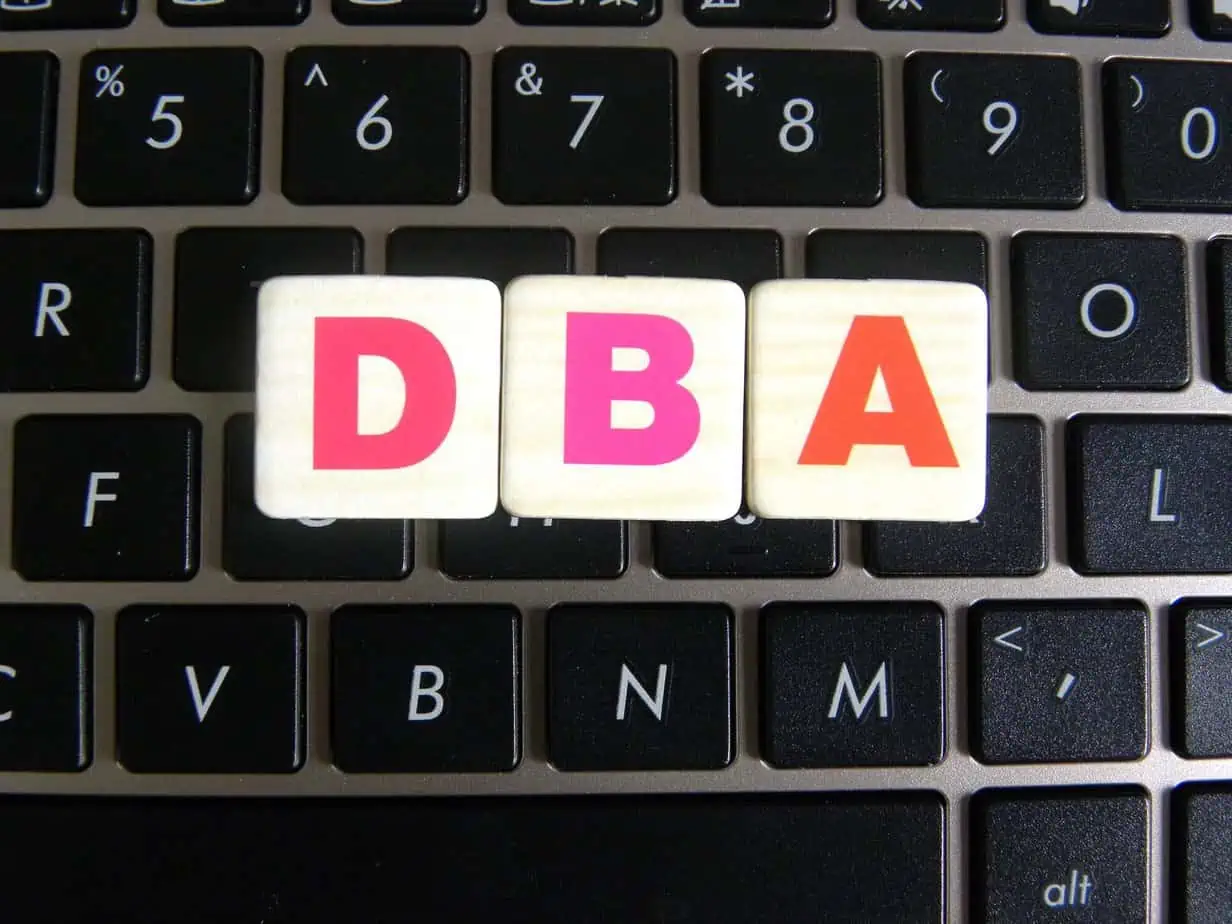If you’re starting a business, you might need (or want) a DBA. While it’s not a business entity, it can be helpful when you want to name your business something other than your personal name.
There are many reasons to file a DBA even if you run a corporation or LLC. Before you register a DBA, learn what it is, how it works, and if/when your business needs one and the steps to create one.
What is a DBA?
DBA stands for doing business as and is your business’s ‘fictitious name.’ In other words, it’s your business’s legal name or the name you operate under. It lets the public know that Jane Doe is operating a business under the name Jane Doe’s Cookie Bakery, for example.
The DBA is different than the owner’s legal name or even the name of a corporation as it’s filed in the paperwork. If you don’t file a DBA, the business automatically carries your name if it’s a sole proprietor or partnership or the corporation’s name if it’s a corporation.
Corporations often have one big company with many little companies within it, each of which has its own DBA to differentiate them from one another.
What Businesses Need a DBA?
While it’s not required to have a DBA, these entities would benefit from using it:
Sole Proprietor and Partnership
By default, sole proprietors and partnerships operate under the owner’s name. Let’s say you run a small business out of your home creating crafts. You could run a sole proprietorship under your name, or you could file a DBA as Jane Doe’s Crafts. This takes your full legal name out of the business name, which some people prefer.
Many business owners prefer a DBA to make the name of their business something more pointed. They prefer to use key words in the title so it’s obvious what they do, such as is the case with Jane’ Doe’s Crafts.
Franchise
If you own a franchise, you may buy the franchise under an LLC or other business entity. That business entity won’t have the franchise’s name, though. You can file a DBA to operate XYZ LLC as the name of the franchise though.
LLCs, Corporations and Limited Partnerships
Technically LLCs, corporations and limited partnerships don’t need to file a DBA, but if they operate under a company name but want something more distinct for a business, they can file a DBA.
This is most common when a corporation or LLC wants to add another branch of their business under the same entity. They can keep the same ‘business identity’ while ‘doing business as’ a company name with the right keywords.
Reasons to use a DBA
Registering a DBA isn’t required in most cases, but here are some reasons to use one:
- Your bank requires it. Some banks require businesses to have a DBA to open a business bank account. You should always keep your business and personal bank accounts separate, so it may be necessary.
- You want to branch out into another business that doesn’t fit your current company name. Rather than starting another corporation or LLC, you can file a DBA for the new branch.
- You want your business to have more credibility. Most consumers give more credibility to businesses that have an ‘actual business name’ versus those that operate under a person’s name.
- You want your business to be more SEO friendly. Keyword use in your business name is key for consumers to find you online. If your registered business name isn’t SEO friendly, you may want to register a DBA.
- You’ll remain legally compliant. If you run a business under a corporation name but branch out without registering a DBA, the business you run under the assumed name that isn’t registered won’t have the same protections your corporation or LLC would offer, which could leave you in financial and legal trouble.
How to File a DBA
Every state has different filing requirements to file a DBA, but in general, here are the steps.
- Go to your county clerk’s office and complete the DBA paperwork
- Pay the filing fee, usually $10 to $100
- Publish a fictitious name ad in the paper (in most areas), this gives the public notice of your intent to do business in the name you’ve chosen
- Operate your business under its new name
Tips for DBA
- You can’t use the words Corp or Inc after your name unless your business is registered as a corporation or LLC
- You should never run a business under an assumed name without registering it or you could face serious fines
- You may have to renew your DBA name, check with your local county or state to find out when the name expires
- You may have to refile the DBA if your business stricture changes, such as new officers join or officers leave your company
- You must provide formal identification of yourself or your business, such as your social security number or EIN (Employee Identification Number)
- It can take a few weeks to a few months to process your DBA so plan accordingly as it depends on how frequently they require you to publish the DBA in the paper
Final Thoughts
Filing a DBA isn’t difficult or expensive, but it can protect you legally and financially. It’s easy to file and can provide your business with the protection and identity it needs.
A DBA is just a doing business as name and is a quick legal procedure that can greatly help your business. Whether you own a sole proprietorship, partnership, corporation or LLC, there are many reasons to consider filing your DBA.

